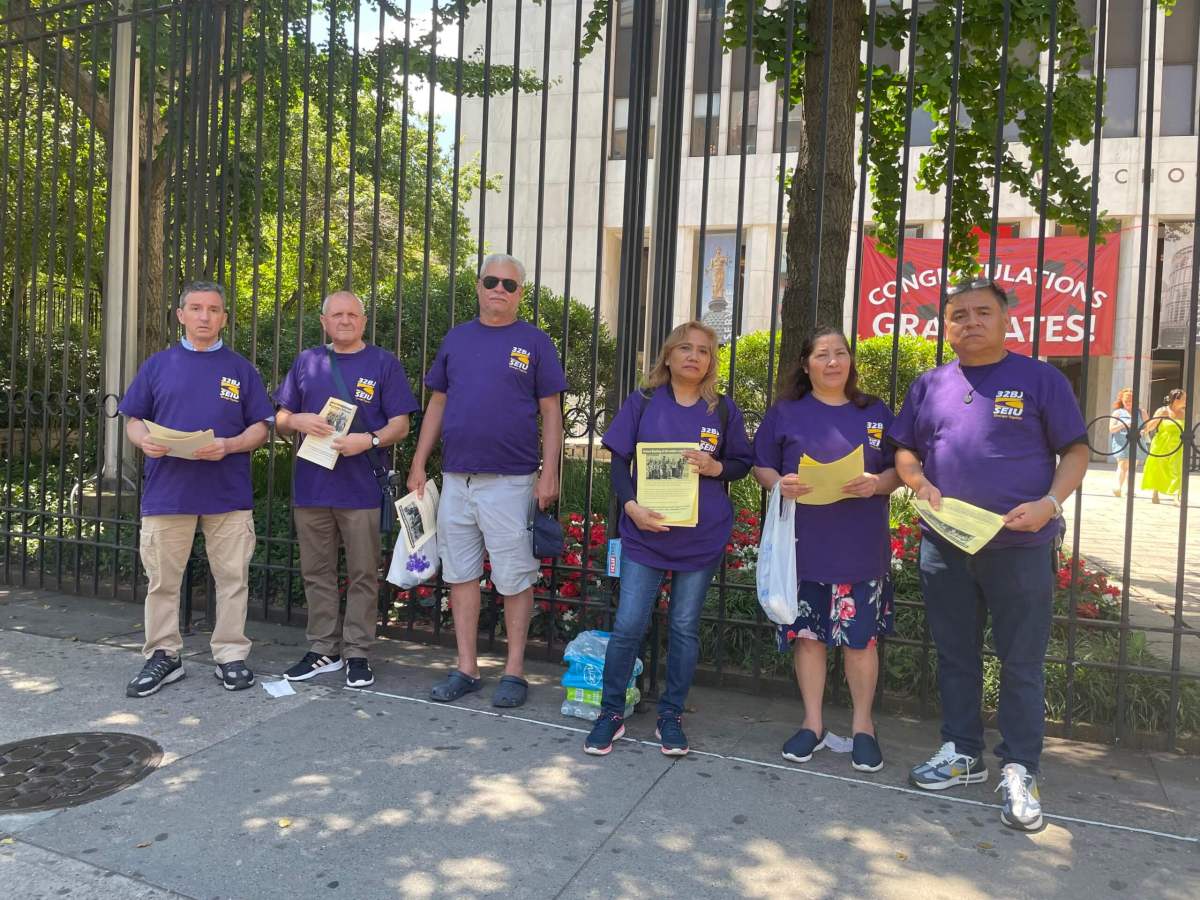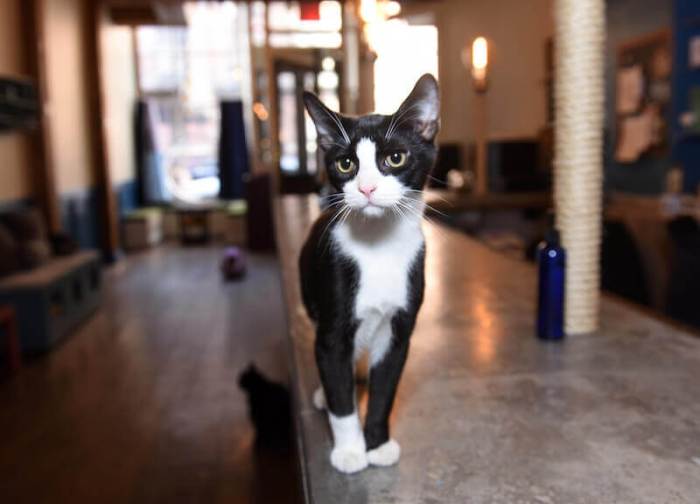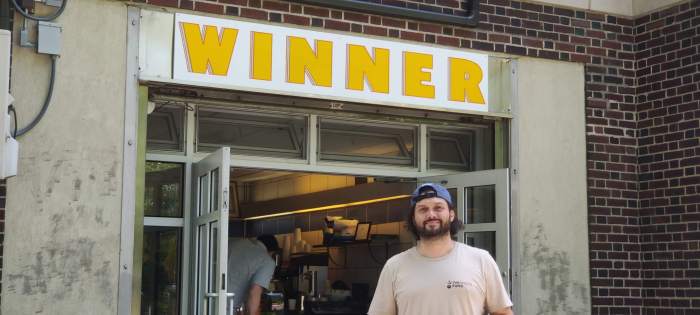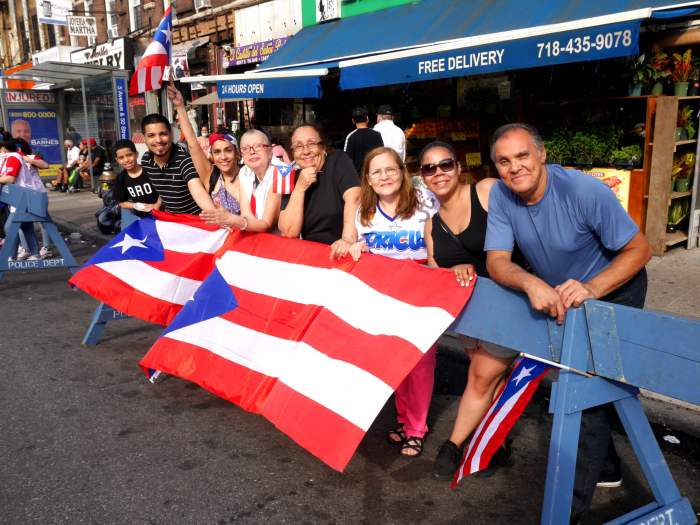Unionized custodial staff at Brooklyn Law School are facing a dramatic pay cut and losing their benefits after the school abruptly ended its contract with the company who had long provided cleaning services.
In early June, Triangle Services, the contractor the school has used for about a decade, informed 32BJ SEIU — the union that has represented the seven members of the overnight cleaning crew for roughly 30 years — that the school had terminated their contract and it would end on June 30.
Employees learned later that the school had signed a new contract with Advantage Cleaners, LLC, which kicks in on Friday, July 1. According to workers and union representatives, Advantage plans to cut the employees’ pay by as much as $13 per hour and won’t offer health insurance, vacation time, or retirement benefits.
“We are a non-union company, that’s it, that’s all.”
Luis Pacheco, the night crew foreman who has worked at the school for more than 30 years, said his regular communication with his supervisors at the school suddenly dried up a few weeks ago.
“I used to send emails daily, and they’d respond, but in that time … they don’t respond back to me,” Pacheco said. “I called my big boss, and I mentioned that, and they said, no, everything is OK, no complaints.”
A call from his union representative broke the news to Pacheco, whose wife also works on the night crew.
In a meeting with the new company, Pacheco was told that his pay would be slashed from $30 to $17 an hour, and that his health insurance, retirement benefits, and vacation time would expire 30 days after Advantage took over.
“They mentioned to me that if I want to keep my benefits, I would pay for it, but they don’t pay anything,” Pacheco said. “[They said,] ‘We are not going to pay vacation or sick time, whatever you have. We are a non-union company, and that’s it, that’s all.’”
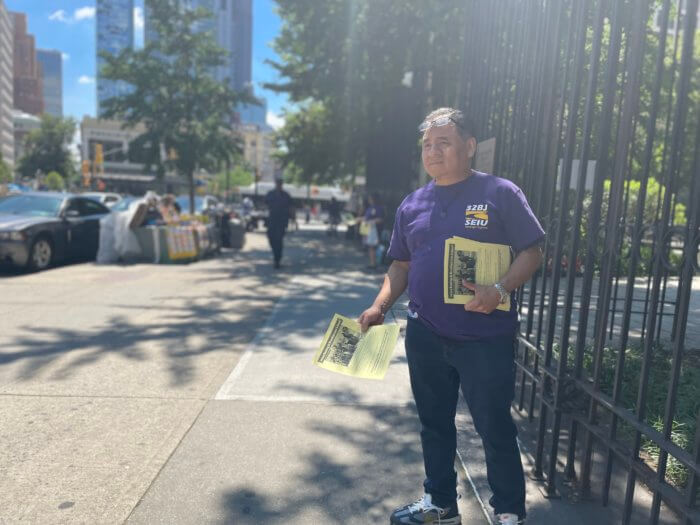
He found out later that the company had told other employees — who, aside from Pacheco and his wife, all had separate meetings — that their full-time hours might be cut down to 30 or 35 hours per week. In addition, Advantage said Pacheco and his crew would have to download a monitoring app to their cell phones so their new employer could track their locations. Pacheco’s cell phone, he said, was provided by Triangle, and he has to give it back. It was not clear if Advantage would give him a new phone.
On June 28, three days before Advantage’s contract kicked in, 32BJ filed a complaint against the company with the National Labor Relations Board, claiming that even if Advantage didn’t discriminate against unionized employees, they had repeatedly said they were a non-union operation, and would likely illegally refuse to bargain with the union.
Under the Displaced Building Service Workers Protection Act, Advantage Cleaners is required to offer existing staff members employment for 90 days after the new contract takes effect.
While the law does not require the new owner to agree to existing union agreements, federal law prohibits employers from discriminating against unionized employees or refusing to bargain with union representatives.
32BJ employees in New York City make $59,000 on average, said Denis Johnston, the organization’s executive vice president and director of the commercial division. The full benefits package, including health insurance for the employee’s spouse and dependents, is worth about $90,000.
It’s not uncommon for an institution like the Brooklyn Law School to put out a bid to contractors in an effort to save a little money on a contractor’s markup — they may choose a company who marks up the price of services by 3.5% rather than 5%, he said.
Usually, when a new contractor takes over, very little changes.
“The vast majority of building owners and institutions in New York City pay the kind of industry standard wage and benefits package which is really … it’s one contract standard that applies across the city,” Johnston said.
The name on paychecks and uniforms changes, he said, but pay, benefits, and hours stay the same. That Advantage was not affiliated with 32BJ was an immediate red flag, he said — many similar companies have existing agreements with the union and would have maintained the previous agreement.
Johnston tried for a few weeks to get in contact with Advantage CEO Omar Miller, he said.
“When I was talking to Advantage, they said, ‘We wish we could pay those wages and benefits but based on the wages they submitted, that won’t be possible,” Johnston said.
Advantage Cleaners did not respond to multiple requests for comment, and the person who answered the number listed on the NLRB complaint as Miller’s mobile phone said Miller was not there — and that he had just spoken to the reporter, who had previously called a different number listed on the company’s website.
Brooklyn Law School staff and students respond
Hasije Demirovic, a member of 32BJ for 38 years and a cleaner at Brooklyn Law School for nearly 19, said she was taken completely by surprise by the news.
“I’m shocked, all of us, all my coworkers,” she said. “We are in shock, we didn’t expect this at all.”
Demirovic supports her husband, who is retired, and is facing a $12 pay cut.
“We also have a mortgage, around $2,000, and I’m taking medication, my husband was sick last year, he had a stroke and surgery,” she said. “With no benefits, I don’t know how we’re going to make it.”
Pacheco is diabetic and relies on his existing health insurance to cover his regular doctor’s appointments and medications, he said. He was scheduled to take five weeks off to have surgery starting on July 1, he said, but now isn’t sure if he can take the full time — or pay for the surgery.
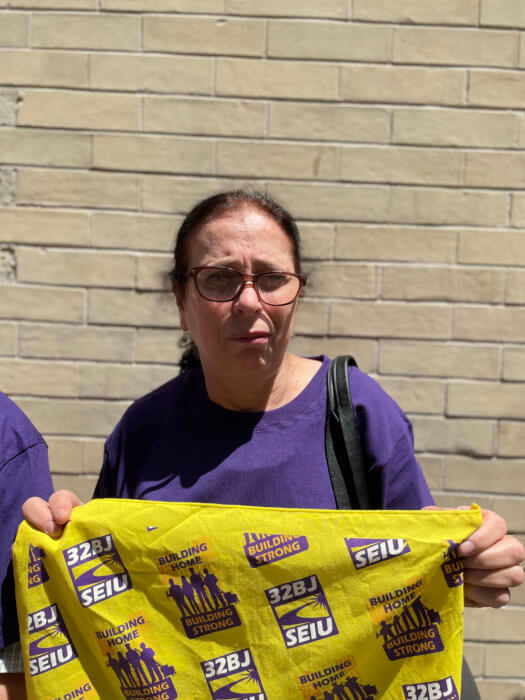
Brooklyn Law School dean Michael Cahill said in a June 27 email to the student body that “a number” of students had been in touch with concerns about the switch to Advantage and how it would impact the seven workers.
“To provide some further detail, we understand that all seven of the employees who worked for the Law School’s prior cleaning-services vendor have been offered employment with Advantage, and that all seven have accepted Advantage’s offer,” Cahill wrote. “The Law School respects the right of these employees to accept or decline employment with Advantage, as well as their right to choose or decline union membership.”
More than 1,100 people have signed a petition started by Brooklyn Law School students calling on Cahill to reverse the decision to hire Advantage.
“Completely embarrassed to be a BLS student. Do better,” one signatory wrote.
In a statement, a representative said the law school recognizes the issue as “a matter between Advantage Cleaning LLC and 32BJ SEIU,” based on the complaint filed by the NLRB.
“Brooklyn Law School in no way harbors anti–union animus,” the representative said. “Brooklyn Law School respects the right of the employees to choose whether or not to be represented by the union.”
It’s unclear if or how the negotiations with Advantage will proceed, Johnston said. The NLRB will be investigating the company now that a complaint has been filed, and he urged the school to reconsider its decision before July 1.
An uncertain future
“These are peoples lives that are at stake here,” he said. “Nobody’s getting rich on $60,000 a year in New York City. The idea that these workers would be asked to have their salary cut to $38,000 a year is just outrageous.”
Pacheco said he was resigned to waiting to see what would happen on July 1. He can’t afford to pass on the job despite the pay cut, he said, but his new wage isn’t enough to pay the mortgage on his New Jersey home, and he worries he’ll be fired after the 90-day grace period.
“I have in my mind, maybe they want to use me for a couple of weeks and then fire me once they know the building,” he said. “I know what the game is, the game is they try to put me out. They want to offer me something, $17 for a couple weeks, but with that money, I cannot pay my mortgage.”
Demirovic agreed. She needs to keep her job, but without benefits, she doesn’t know how she can pay for her husband’s medical care and medications. But quitting is an even scarier prospect.
“Where am I going to find a job? I’m old, it’s not my time to retire now, where am I going to find that other job? Looking for a job in the union is so hard for me now, this kind of age,” she said. “Take the union and put us back the way we were. That’s the only hope for us.”


